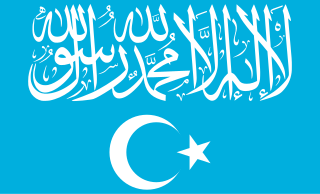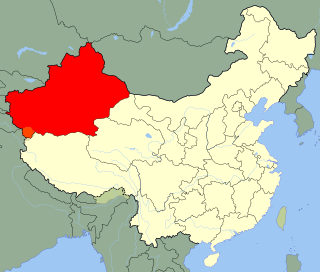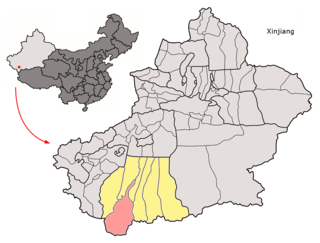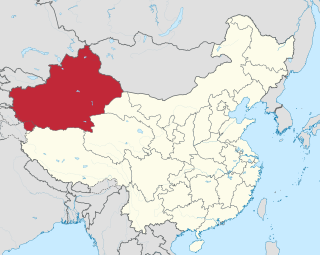
East Turkestan or East Turkistan, also called Uyghuristan, is a loosely-defined geographical region in the northwestern part of the People's Republic of China, which varies in meaning by context and usage. The term was coined in the 19th century by Russian Turkologists, including Nikita Bichurin, who intended the name to replace the common Western term for the region, "Chinese Turkestan", which referred to the Tarim Basin in Southern Xinjiang or Xinjiang as a whole during the Qing dynasty. Beginning in the 17th century, Altishahr, which means "Six Cities" in Uyghur, became the Uyghur name for the Tarim Basin. Uyghurs also called the Tarim Basin "Yettishar," which means "Seven Cities," and even "Sekkizshahr", which means "Eight Cities" in Uyghur. Chinese dynasties from the Han dynasty to the Tang dynasty had called an overlapping area the "Western Regions".

The Turkistan Islamic Party (TIP) is a Uyghur Islamic extremist organization founded in Pakistan by Hasan Mahsum. Its stated goals are to establish an Islamic state in Xinjiang and Central Asia.

The East Turkestan independence movement is a political movement that seeks the independence of East Turkestan, a large and sparsely-populated region in northwest China, as a nation state for the Uyghur people. The region is currently administered by the People's Republic of China (PRC) in the Xinjiang Uygur Autonomous Region (XUAR). Within the movement, there is widespread support for the region to be renamed, since "Xinjiang" is seen by independence activists as a colonial name. "East Turkestan" is the best-known proposed name as it is the historical geographic name of the region and the name of the two independent states that briefly existed in the region in the first half of the 20th century.

The East Turkestan Republic (ETR) was a short-lived satellite state of the Soviet Union in northern Xinjiang, which existed from 1944 to 1946. It is often described as the Second East Turkestan Republic to differentiate it from the First East Turkestan Republic (1933–1934), but "second" was never a part of its official name.

The East Turkestan Liberation Organization (ETLO) was a secessionist Uyghur organization that advocated for an independent Uyghur state named East Turkestan in the Western Chinese province known as Xinjiang. The organization was established in Turkey in late 1997 to fight against the Chinese government in Xinjiang, a territory of ethnic Uyghur majority.

Hasan Mahsum, also known as Abu-Muhammad al-Turkestani and Ashan Sumut, was an Uyghur militant who was the leader of the Turkistan Islamic Party, an Islamic extremist group suspected of having ties with Al Qaeda. He was shot dead in a counter-terrorism operation on October 2, 2003 by the Pakistani Army.
Terrorism in China refers to the use of terrorism to cause a political or ideological change in the People's Republic of China. The definition of terrorism differs among scholars, between international and national bodies and across time and there is no legally binding definition internationally. In the cultural setting of China, the term is relatively new and ambiguous.

The 2008 Uyghur unrest is a loose name for incidents of communal violence by Uyghur people in Hotan and Qaraqash county of Western China, with incidents in March, April, and August 2008. The protests were spurred by the death in police custody of Mutallip Hajim.

The 2008 Kashgar attack occurred on the morning of 4 August 2008, in the city of Kashgar in the Western Chinese province of Xinjiang. According to Chinese government sources, it was a terrorist attack perpetrated by two men with suspected ties to the Uyghur separatist movement. The men reportedly drove a truck into a group of jogging police officers, and proceeded to attack them with grenades and machetes, resulting in the death of sixteen officers.

The Ghulja, Gulja, or Yining incident was the culmination of the Ghulja protests of 1997, a series of demonstrations in the city of Yining—known as Ghulja in Uyghur—in the Xinjiang autonomous region of China.

The World Uyghur Congress (WUC) is a US funded international organization of exiled Uyghur groups that claims to "represent the collective interest of the Uyghur people" both inside and outside of the Xinjiang Uyghur Autonomous Region of the People's Republic of China. The World Uyghur Congress claims to be a nonviolent and peaceful movement that opposes what it considers to be the Chinese occupation of East Turkestan (Xinjiang) and advocates rejection of totalitarianism, religious intolerance and terrorism as an instrument of policy. It has been called the "largest representative body of Uyghurs around the world" and uses more moderate methods of human rights advocacy to influence the Chinese government within the international community in contrast to more radical Uyghur organizations.

The 2011 Hotan attack was a bomb-and-knife attack that occurred in Hotan, Xinjiang, China on 18 July 2011. According to witnesses, the assailants were a group of 18 young Uyghur men who opposed the local government's campaign against the burqa, which had grown popular among older Hotan women in 2009 but were also used in a series of violent crimes. The men occupied a police station on Nuerbage Street at noon, killing two security guards with knives and bombs and taking eight hostages. The attackers then yelled religious slogans, including ones associated with Jihadism, as they replaced the Chinese flag on top of a police station with another flag, the identity of which is disputed.

The 2011 Kashgar attacks were a series of knife and bomb attacks in Kashgar, Xinjiang, China on July 30 and 31, 2011. On July 30, two Uyghur men hijacked a truck, killed its driver, and drove into a crowd of pedestrians. They got out of the truck and stabbed six people to death and injured 27 others. One of the attackers was killed by the crowd; the other was brought into custody. On July 31, a chain of two explosions started a fire at a downtown restaurant. A group of armed Uyghur men killed two people inside of the restaurant and four people outside, injuring 15 other people. Police shot five suspects dead, detained four, and killed two others who initially escaped arrest.
The 2012 Yecheng attack was a terrorist attack by Uyghur separatist extremists that occurred on February 28, 2012, in Yecheng, Xinjiang, a remote town situated about 150 miles from China's border with Pakistan. Details of the attack are disputed: according to Chinese government reports and court documents, at around 6 p.m. that day, a group of eight Uyghur men led by religious extremist Abudukeremu Mamuti attacked pedestrians with axes and knives on Happiness Road. Local police fought with the attackers, ultimately killing all and capturing Mamuti. State-run media reported that one police officer died and four police were injured, while 15 pedestrians died from Mamuti's assault and 14 more civilians were injured. Chinese officials characterized the event as a "terrorist attack."

The Xinjiang conflict, also known as the East Turkistan conflict, Uyghur–Chinese conflict or Sino-East Turkistan conflict, is an ethnic geopolitical conflict in what is now China's far-northwest autonomous region of Xinjiang, also known as East Turkistan. It is centred around the Uyghurs, a Turkic ethnic group who constitute a plurality of the region's population.
On 26 June 2013, rioting broke out in Shanshan County, in the autonomous region of Xinjiang, China. 35 people died in the riots, including 22 civilians, two police officers and eleven attackers.
On 28 October 2013, a car ran over pedestrians and crashed in Tiananmen Square, Beijing, China, in a terrorist suicide attack. Five people died in the incident; three inside the vehicle and two others nearby. Police identified the driver as Usmen Hasan and the two passengers as his wife, Gulkiz Gini, and his mother, Kuwanhan Reyim. An additional 38 people were injured.
On the early morning of Wednesday, 30 July 2014, Juma Tahir, the imam of China's largest mosque, the Id Kah Mosque in northwestern Kashgar, was stabbed to death by three young male Uyghur extremists. Religious leaders across denominations condemned the attack.

The Xinjiang internment camps, officially called vocational education and training centers by the government of China, are internment camps operated by the government of Xinjiang and the Chinese Communist Party Provincial Standing Committee. Human Rights Watch says that they have been used to indoctrinate Uyghurs and other Muslims since 2017 as part of a "people's war on terror", a policy announced in 2014. Thirty-seven countries have expressed support for China's government for "counter-terrorism and deradicalization measures", including countries such as Russia, Saudi Arabia, Cuba, and Venezuela; meanwhile 22 or 43 countries, depending on source, have called on China to respect the human rights of the Uyghur community, including countries such as Canada, Germany, Turkey and Japan. Xinjiang internment camps have been described as "the most extreme example of China's inhumane policies against Uighurs". The camps have been criticized by the subcommittee of the Canadian House of Commons Standing Committee on Foreign Affairs and International Development for persecution of Uyghurs in China, including mistreatment, rape, torture, and genocide.
In May 2014, the Government of the People's Republic of China (PRC) launched the "Strike Hard Campaign against Violent Terrorism" in the far west province of Xinjiang. It is an aspect of the Xinjiang conflict, the ongoing struggle by the Chinese Communist Party (CCP) and the Chinese government to manage the ethnically diverse and tumultuous province. According to critics, the CCP and the Chinese government have used the global "war on terrorism" of the 2000s to frame separatist and ethnic unrest as acts of Islamist terrorism to legitimize its counter-insurgency policies in Xinjiang. Chinese officials have maintained that the campaign is essential for national security purposes.











